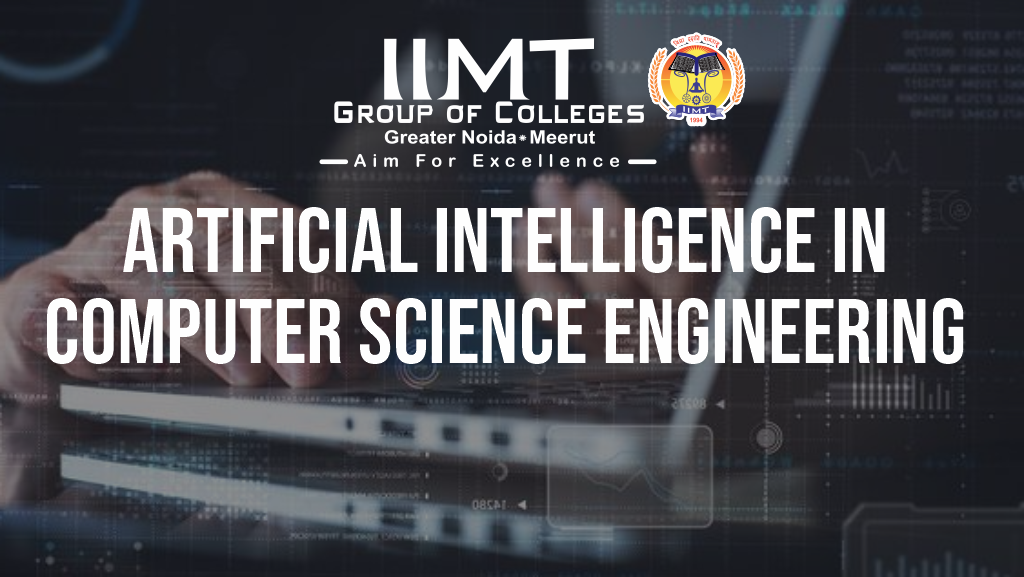Artificial Intelligence in Computer Science Engineering: Revolutionizing the Future
 IImt College
IImt College
Artificial Intelligence (AI) has evolved from a speculative concept to a groundbreaking technology that is reshaping industries across the globe. In the field of Computer Science Engineering (CSE), AI has become a critical component, enabling the development of innovative applications that were once thought to be the stuff of science fiction. As AI continues to advance, its integration into CSE is creating transformative changes in how we approach problem-solving, software development, data analysis, and even ethical challenges.
The Role of AI in Computer Science Engineering
In CSE, AI encompasses a range of technologies, including machine learning (ML), natural language processing (NLP), robotics, computer vision, and neural networks. These technologies are designed to mimic human cognitive functions such as learning, problem-solving, and decision-making, but with far greater speed and precision. CSE students and professionals are increasingly required to understand and leverage AI algorithms to tackle complex challenges.
Machine Learning and Data Science
Machine learning, a subset of AI, plays a pivotal role in data analysis and prediction. In CSE, ML algorithms are used to process vast amounts of data, uncover patterns, and make predictions. This has applications in various domains, including finance (for fraud detection), healthcare (for disease diagnosis), and e-commerce (for recommendation systems). By training algorithms on historical data, systems can learn and adapt without explicit programming, making them more efficient over time.
Data science, which is closely linked to machine learning, involves extracting insights from large datasets. With the advent of big data, AI-driven analytics has become indispensable. CSE professionals specializing in AI can build systems that help businesses make data-driven decisions, optimize resources, and improve customer experiences.
Natural Language Processing and Human-Computer Interaction
Natural Language Processing (NLP) allows machines to interpret, understand, and generate human language. In CSE, NLP is used to develop chatbots, virtual assistants, and sentiment analysis tools, enhancing human-computer interaction. For example, voice-activated assistants like Amazon's Alexa and Apple's Siri rely on NLP to process spoken language and respond in a meaningful way. NLP techniques are also applied in text mining, language translation, and information retrieval systems, making them essential for developing user-friendly interfaces and improving accessibility.
Computer Vision and Robotics
Computer vision enables machines to interpret and understand visual data from the world, making it a key area of research in CSE. AI-powered computer vision systems can be used for image recognition, object detection, autonomous vehicles, and even medical imaging. For instance, self-driving cars use computer vision algorithms to navigate roads, identify obstacles, and make real-time decisions.
Robotics, another field powered by AI, involves the creation of machines that can perform tasks autonomously or with minimal human intervention. In CSE, robotics applications are vast, ranging from manufacturing automation to medical robots that assist in surgeries. AI-powered robots are capable of adapting to changing environments and improving their performance through continuous learning.
Ethical Considerations and AI Governance
As AI technologies continue to advance, ethical concerns have emerged regarding their impact on society. In CSE, AI developers are tasked with ensuring that AI systems are built with fairness, transparency, and accountability in mind. Bias in AI algorithms, for instance, can lead to discriminatory outcomes in areas such as hiring, criminal justice, and lending. To address these issues, researchers in CSE are working on methods to mitigate bias, ensure privacy, and create regulations for the responsible use of AI.
The Future of AI in CSE
Looking ahead, AI's role in CSE will continue to expand, with advancements in deep learning, reinforcement learning, and quantum computing further pushing the boundaries of what is possible. As AI becomes increasingly integrated into everyday life, CSE professionals will play a central role in shaping its development and ensuring that its benefits are accessible to all.
In conclusion, artificial intelligence is not just a tool for computer scientists but a transformative force that is fundamentally altering the landscape of engineering and technology. From automating mundane tasks to solving complex problems, AI is paving the way for a future where machines and humans collaborate more seamlessly than ever before. For students and professionals in CSE, mastering AI is no longer optional—it is essential for staying at the forefront of innovation.
Best B Tech Artificial Intelligence & Data Science Colleges Greater Noida where IIMT is well ahead of its counterparts, which helps students to obtain information.
Visit Our website:- https://www.iimtindia.net/iimt-college-engineering/btech-artificial-intelligence-data-science.php
Subscribe to my newsletter
Read articles from IImt College directly inside your inbox. Subscribe to the newsletter, and don't miss out.
Written by
